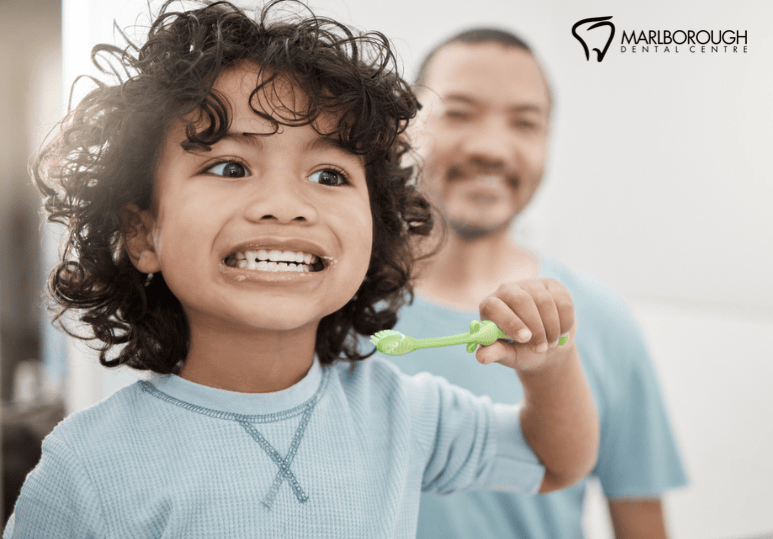Dental Care For Children: Toothbrushing At Each Age
When To Start
Developing good oral health habits for your family starts young. Dental care for children starts before your child even has teeth. Although your baby will initially only have gums and you don’t need to use a toothbrush on this soft tissue, you should wipe your child’s gums with a damp washcloth or a piece of damp gauze to help get rid of any bacteria that builds up on their gums. Once their first tooth erupts, it’s time to start brushing it! Your child needs to have their teeth brushed from the first tooth to keep it healthy as well as to continue keeping the gums clean. Because baby gums are very sensitive and delicate, you will want to use a soft-bristled brush with a small head. Don’t use fluoride toothpaste on babies, and instead use baby-specific toothpaste to ensure it is safe for them.
Age 2
At this point, your child will have all of their teeth and may be interested in helping to brush their own teeth as they begin imitating the people around them. They will still need a child-size toothbrush and baby toothpaste without fluoride, but helping them learn children’s dental care at this age will help to develop healthy habits. If you can find a toothbrush with grip, this can help your child hold on to the unfamiliar tool.
Age 3
At this point your child is allowed to use fluoride toothpaste, but only use a pea-sized amount. If your child didn’t start brushing their teeth at 2, now is a good time to start them on it. If they have a hard time staying focused or brushing for long enough, either brush at the same time beside them, set an alarm, or play a song so that your child learns to brush their teeth for a full 2 minutes.
Ages 5 To 8
After a few years of helping your child brush their teeth, they will be able to do this on their own. They likely will no longer need the grip of their age 3 toothbrush and can instead use a slender-handled toothbrush, although they will likely still need a small toothbrush head. As they age through the 5 to 8-year-old range, you may be able to leave them unsupervised while they brush their teeth, although if you have a child who notoriously dislikes brushing their teeth you will want to continue monitoring them. If it is a regular problem, contact your dentist to discuss your child’s dental care and habits.
Ages 10 To 13
The preteen years are a good time to switch your child to an adult-sized toothbrush, as their jaws will be larger and their motor function skills will be fully developed for adequate toothbrushing.
14 And Older
Although at this point your child will be brushing like an adult, other changes may soon be coming. Many preteens and teens get braces or Invisalign® that will require more care. Braces may require special ways of flossing and Invisalign® will require care for the aligners, including cleaning and ensuring they are taken out while your child eats or drinks (except for water).
Learn more about dental care for children as their mouth changes by reading Children’s Dental Health Month: Oral Health For Your Child.
Calgary Dental Care For Children At Marlborough Dental Centre
From the first tooth to Invisalign®, dental care for children is both important for the sake of their oral health and so that healthy oral habits are developed while young. Your child should get accustomed to tooth brushing and regular trips to the dentist from a young age so that these crucial aspects of oral health are normalized. At Marlborough Dental Centre, Dr. Popp and his team have years of experience in pediatric dentistry and help make dental care for children enjoyable for all ages through a caring and gentle approach to your child's oral care. To schedule an appointment with Marlborough Dental Centre, call 1-403-248-2066 or fill out the online contact form.
FAQ
Q: How often should my child see the dentist?
A: You should visit the dentist for child dental care every 6 months.
Q: How important is dental care for children?
A: Children’s dental care impacts more than oral health, it also impacts overall health and comfort. Oral health has been linked to various ailments and health issues as well as tooth and gum health. To learn more, read The Importance Of Good Oral Health For Your Child’s Overall Health.
Q: When should my child start losing their teeth?
A: Children should lose their baby teeth somewhere between the ages of 6 and 12. If your child is over 12 and still has one or more baby teeth, visit Marlborough Dental Centre in NE Calgary or schedule a dental exam and determine the proper course of action.




